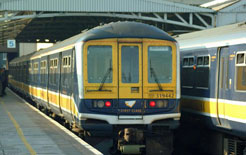SMALL businesses trying to keep their transport carbon footprint down and make most effective use of transport systems will be heartened by the government’s announcement to increase rail stock by 2100 carriages before the end of 2019.
Transport Secretary Philip Hammond said the £600m investment in London’s Thameslink and £900m investment in electrification would modernise the rail network, tackle overcrowding, improve reliability and speed up journeys.
The electrification projects areon lines between London and Didcot, Newbury and Oxford as well as between Liverpool, Manchester, Preston and Blackpool. In addition to the 2,100 new carriages, Britain is also to get a new fleet of intercity trains, replacing the ageing 30 year old ‘Intercity 125s’ on the Great Western and East Coast main lines, the Transport Secretary announced.
“At a time of severe pressure on public spending, it would be tempting to cut back on investment in our railways.But we cannot afford not to invest in Britain’s future,” said Mr Hammond.
The Transport Secretary added: “We have already committed to the Crossrail project and to £14bn to support capital maintenance and investment in our railways over the next four years. I can also confirm that the Thameslink project will go ahead in its entirety and 650 further carriages to reduce overcrowding. In total this amounts to 2,100 new carriages which will help make our railways fit for the 21st century.”
Nevertheless, any attempt to reduce transport expenditure by SMEs was knocked on the head by the Association of Train Operating Companies (ATOC), who announced that while overcrowding might be eased by the government’s announcement, train fares would rise by an average of 6.2% in January 2011.
According to the Office of Rail Regulation the average price paid for a single journey was currently £4.89; applying the 6.2% increase to this would see the average single fare rise to £5.19 in January.
Michael Roberts, chief executive of ATOC said: “We know times are tough for many people but next year’s fare increases will ensure that Britain can continue investing in its railways.” Mr Roberts added that, through electrification, trains would be greener, quieter and more reliable.
Despite the prospect of fare increases, the Chartered Institute of Logistics and Transport (CILT)’s chief executive, Steve Agg, welcomed the investment: “The government has recognised that transport represents a key ingredient in both the growth of the economy and the social needs of our citizens. In the twenty-first century we need to create adequate facilities for people to travel by rail for work, family and social purposes, in reasonable comfort. Clearly, the trend for increased rail use cannot be allowed to continue without proper consideration of passenger needs and today’s announcements regarding new rolling stock and other measures to tackle overcrowding are therefore most welcome,” said Mr Agg.
“The coalition government appears to understand the absolute link between adequate transport infrastructure and facilities, with the growth of the general economy. Transport is the utility that serves, supports and facilitates so many other factors in the way we live our lives in the UK. We simply must continue to respect that reality and invest in its continuous development,” Mr Agg added.
Photo credit: www.FreeFoto.com But higher fares will add to transport costs







